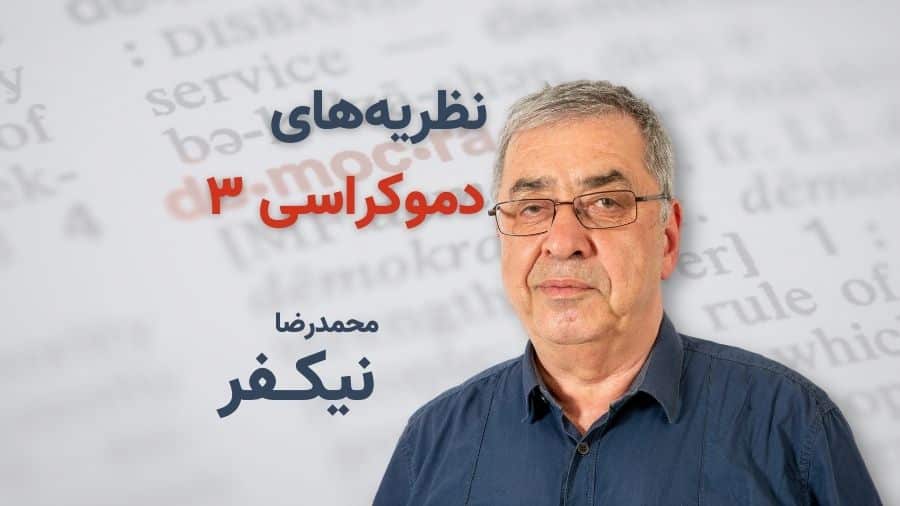Course Summary
This is the third course provided on democracy.
The first course was titled “Theories of Democracy”.
The second course was an introduction to the topic of Radical Democracy, during which various intellectuals on the subject of democracy were discussed.
The title of the current course is “Radical Democracy – An Introduction to Current Debates”. It is not necessary to have passed the previous two courses, but it is recommended to watch the videos of those two courses which are available to everyone (link in the resources).
In the first class, we got acquainted with some new theories of democracy, discussed views in the form of conventional liberalism, and also mentioned progressive critical views. The leading critical views are those who consider democracy established in the countries with liberal democratic system to be mostly formal and lacking in terms of public participation in decisions. Criticism of democracies continues throughout their lives. Criticism has been made both from the angle of authoritarianism, in defense of the rule of the monarchy, nobility, and from the angle of advancing radical democracy.
In the second course, we discussed the views of classical figures that have influenced current ideas about democratizing democracy and radical democracy.
In the current course, we want to dive more into contemporary discussions. In this course, while explaining the current situation in the world following the events of the 20th century, some ideas and thinkers are examined that are necessary to be familiar with the current discussions about “radical democracy”. We will see that these discussions are also instructive for dealing with the issue of transitioning to democracy.
Resources
Public Resources
Videos of Theories of Democracy 1 can be found in the Agora section of Iran Academia.
Videos of Theories of Democracy 2 can be found in the Agora section of Iran Academia.
Frank Cunningham: Theories of Democracy. A critical introduction. Routledge 2002
Main Resources
– Democracy and political, social and cultural transformations
Eric Hobsbawm. Age Of Extremes: The Short Twentieth Century, 1914-1991. Translation: Hassan Mortazavi, Agah, 2004
History in the Age of Extremes, Discussion with Eric Hobsbawm
– Democracy and Freedom
Isaiah Berlin, “TWO CONCEPTS OF LIBERTY,” Four Essays On Liberty, (Oxford University Press, 1969), p. 118-172.
Two Concepts of Liberty – Translation: Shirindokht Daghighian
Skinner: A Third Concept of Freedom – Link to video
– The Fundamental Issue of Subjugation
Étienne de La Boétie: The Politics of Obedience; The Discourse of Voluntary Servitude
– The Subject of People
Videos of the Lectures of Radical Democracy 1, especially Video #12
– György Lukács
History and Class Consciousness
– Antonio Gramsci
Gramsci: State and Civil Society
General description of Gramsci’s life and works from Stanford University’s Online Philosophical Dictionary
plato.stanford.edu-Antonio Gramsci
It is recommended to read Gramsci’s Letters from Prison, Volumes 1 and 2
A selection of Gramsci’s prison notes
– Johann Galtung
Galtung, Johan (1969). “Violence, Peace, and Peace Research”.
If you haven’t taken a course on the history of political thought before, click on the lectures below and watch the videos:
Lectures on Critical Thinking – Mohammad Reza Nikfar
Other resources may be introduced during the course.
Lectures
By clicking on any of the following titles, the lecture video will open on the screen
Our suggestion is to set the video display speed to 1.25.
نظریههای دموکراسی ۳ – ۱ نظریههای دموکراسی ۳ – ۲ نظریههای دموکراسی ۳ – ۳ نظریههای دموکراسی ۳ – ۴ نظریههای دموکراسی ۳ – ۵ نظریههای دموکراسی ۳ – ۶ نظریههای دموکراسی ۳ – ۷ نظریههای دموکراسی ۳ – ۸ نظریههای دموکراسی ۳ – ۹ نظریههای دموکراسی ۳ – ۱۰ نظریههای دموکراسی ۳ – ۱۱ نظریههای دموکراسی ۳ – ۱۲

